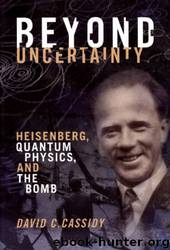Beyond Uncertainty: Heisenberg, Quantum Physics, and the Bomb by David C. Cassidy

Author:David C. Cassidy [Cassidy, David C.]
Language: eng
Format: epub
Tags: General, History, Science, 20th Century, Biography & Autobiography, Germany, Biography, Europe, Military, Physics, Heisenberg; Werner, Nuclear Physics, Physicists - Germany, Atomic Bomb - Germany - History - 20th Century, Physicists, Quantum Theory, Atomic Bomb, Nuclear Warfare, Science & Technology
ISBN: 9781934137284
Publisher: Bellevue Literary Press
Published: 2009-02-01T07:40:28+00:00
Erwin and Werner (right) with their newly mobilized father in front of the University of Munich at the outbreak of World War I.
During those months in Osnabrück, Werner surely discussed and reflected upon his father’s often expressed political outlook and his many activities that resulted from it during the prewar years. Professor Heisenberg’s views were typical of his generation and station, and, despite Werner’s later rebellion, they were influential on his son’s outlook. Studies have shown that, following the unification of the Reich in 1871, socially prominent German professors turned ostensibly apolitical in public affairs. This was intended both to insulate themselves from the mass politics of the lower, working classes—officials elected by the lower classes could not be entrusted to administer their exalted profession—and to establish their status as keepers of German culture. Although they still engaged in politics, they regarded their activities as residing outside the party system and in service to German culture (especially to themselves as “bearers of culture”), so they could believe themselves free of political taint.19 Many academics joined self-interest pressure groups, such as the Gymnasium Teachers’ Association, which promoted German cultural interests in the international arena. They were encouraged by the example of other professionals—bankers, industrialists, military men—who were exercising their own “apolitical” influence in state service.
By 1910, the unified empire had achieved a powerful economy and military, but its diplomacy was weak. A late entrant in the international grab for power and markets, the country had failed to achieve a meaningful alliance with any of its competitors or to establish a large colonial market and source of raw materials for its expanding industries. The German people and their political leaders felt themselves increasingly isolated internationally and surrounded by hostile forces. The Balkan Peninsula to the southeast, the “powder keg of Europe,” provided one outlet and a possible geographic wedge to Germany’s ally, Turkey. German classical scholars, including the occupant of Munich’s chair for Byzantine studies, provided a connection—a cultural one—to Greece, the southern end of the Balkan Peninsula.
When Werner’s father assumed his Munich chair in 1910, he immediately took up the apolitical cultural barrage his predecessor, Krumbacher, had instigated, and he aimed it directly at the Balkans, Greece in particular. Culture could obviously serve many purposes. Although he followed Krumbacher’s example on nearly every academic issue, Heisenberg’s very first publication as professor contradicted his colleague’s stand on the intense controversy then raging over vulgar Greek.20 Heisenberg and other German scholars lobbied against a proposal to replace classical Greek as the official language of Greece, seeking to bind Greece more closely to Germany through the German preservation of classical Greek language and culture.
The outbreak of war intensified the political efforts of academics on all sides. No nation saw itself as an aggressor; each believed that it was simply fighting to defend home and culture from those who would destroy them. For Germany, lightning offense as a defense justified the invasion of neutral Belgium. This action, together with the unfortunate destruction of Belgian art
Download
This site does not store any files on its server. We only index and link to content provided by other sites. Please contact the content providers to delete copyright contents if any and email us, we'll remove relevant links or contents immediately.
Fanny Burney by Claire Harman(26592)
Empire of the Sikhs by Patwant Singh(23069)
Out of India by Michael Foss(16845)
Leonardo da Vinci by Walter Isaacson(13312)
Small Great Things by Jodi Picoult(7114)
The Six Wives Of Henry VIII (WOMEN IN HISTORY) by Fraser Antonia(5495)
The Wind in My Hair by Masih Alinejad(5085)
A Higher Loyalty: Truth, Lies, and Leadership by James Comey(4947)
The Crown by Robert Lacey(4802)
The Lonely City by Olivia Laing(4796)
Millionaire: The Philanderer, Gambler, and Duelist Who Invented Modern Finance by Janet Gleeson(4462)
The Iron Duke by The Iron Duke(4348)
Papillon (English) by Henri Charrière(4255)
Sticky Fingers by Joe Hagan(4188)
Joan of Arc by Mary Gordon(4098)
Alive: The Story of the Andes Survivors by Piers Paul Read(4017)
Stalin by Stephen Kotkin(3956)
Aleister Crowley: The Biography by Tobias Churton(3628)
Ants Among Elephants by Sujatha Gidla(3459)
